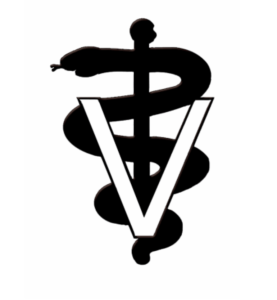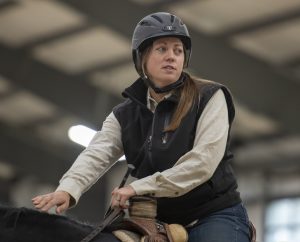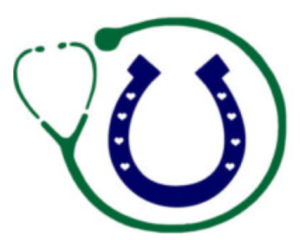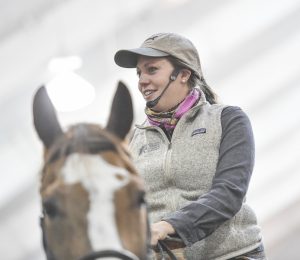Editor’s Note:
 To benefit our equines, tasks are often performed by specialized individuals: farriers, equine dentists, and veterinarians. For those who can afford more, there are nutritionists, saddle fitters, trainers, chiropractors, and body workers. There are acupuncturists, equine scientists and researchers.
To benefit our equines, tasks are often performed by specialized individuals: farriers, equine dentists, and veterinarians. For those who can afford more, there are nutritionists, saddle fitters, trainers, chiropractors, and body workers. There are acupuncturists, equine scientists and researchers.
How is the horse best served by this array of talented workers? Often horse owners can feel empowered, educated, and inspired by the help provided. But we may also feel lost, humbled, overwhelmed, and underserved.
At Cayuse Communications, we’re interested in a discussion around the merits and hazards of hiring professional help. As part of this conversation, we consider the relationship between veterinarians, their human clients, and their equine patients.
Amy Skinner is a regular guest columnist and has been a horse gal since age six. She presented an arena demonstration with fellow trainer and rider, Katrin Silva, at the Best Horse Practices Summit.
The author of The Middle Road and To Catch a Horse, she rides and teaches dressage and Western. Skinner has studied at the Royal Andalusian School of Equestrian Art in Spain, with Buck Brannaman, Leslie Desmond, Brent Graef, and many others.
 Amy Skinner writes:
Amy Skinner writes:
I had surgery this week. I wouldn’t say that I enjoyed it, but the nurses, doctors, and surgeons all worked very hard to ensure that my experience was as pleasant as possible. The nurses joked with me, and we talked about the Netflix show I watched while waiting for surgery. The anesthesiologist even gave me lidocaine before giving me an IV, to make sure that the needle did not cause me pain. I got loopy on some drugs, was treated with respect by the nurses. Each took their time to explain exactly what to expect and what would happen for me. I was as relaxed as you can be during a medical procedure. I went home thinking pleasant thoughts about everyone in the hospital. As I feel I have a relationship with these medical professionals, I don’t feel apprehensive about my post-op appointment. I’d even say my experience has lent itself to me healing well.
While I was in surgery, my mare was not having a good medical experience. The story was relayed to me when I got home: a simple procedure of removing stitches in her shoulder did not go smoothly, and escalated to the point of the vet being asked to leave. Since I wasn’t there, I can’t say for sure what happened. But before that event, I was able to single-handedly flush out the wound with a catheter without haltering my horse. After the event, I couldn’t get near the spot without her becoming defensive and even aggressive. My best horse, who has handled beautifully for the most part until this event, has been traumatized by the vet.
 With equine vets, I’ve had more good experiences than bad ones. I think fondly of the great Dr. Cindy Kimbrell, who helped piecemeal my poor mustang back together after a horrific injury. She was incredibly gentle with my wild, sometimes fractious horse. Her fantastic veterinary skill combined with a wonderfully gentle hand, and good bedside manner made for a good outcome. Her skills saved her life, my life, and his life that day. She listened to the horse and handled him in the way he needed.
With equine vets, I’ve had more good experiences than bad ones. I think fondly of the great Dr. Cindy Kimbrell, who helped piecemeal my poor mustang back together after a horrific injury. She was incredibly gentle with my wild, sometimes fractious horse. Her fantastic veterinary skill combined with a wonderfully gentle hand, and good bedside manner made for a good outcome. Her skills saved her life, my life, and his life that day. She listened to the horse and handled him in the way he needed.
Negative experiences, though, tend to stick in our heads and linger.
I have great respect for vets. I appreciate the duress they are under daily, working with dangerous large beasts who are trying to avoid their attempts to treat their ailments. I understand that even simple procedures put veterinary professionals at risk, and that many horses have poor ground manners or are not easy to work on. I also understand how financial strain and financial pressure can impact one’s mental state. Suicide rates are sad and worrisome.
As a horse trainer, my job is to prepare my horses for the real world, especially as it relates to farrier, dental and vet care. I do my best to set them up for success. But how to prepare a horse for poor treatment? Rough handling that creates fear responses. Fear responses may create more rough and punitive handling. It’s cycle that is easily avoided.

Amy Skinner at the BHPS
A horse’s memory is sharp when it comes to bad experiences. One bad appointment can lead to long-term repeated bad experiences.
Alternatively, a few extra moments of preparation, “getting to know you” handling, a little sedation when needed, a little lidocaine when appropriate can go a long way. [When it comes to sedation, vets and clients are not always in agreement because of cost and other factors. But I’d rather see a fearful horse sedated than manhandled. I don’t envy the mental tight rope a vet is forced to walk – between safety, pleasing the client, and being effective with the job they came to do.
As Dr. Sheryl King mentioned here, it could be that hubris combined with lack of education is at work.
When I assist in teaching the equine behavior and handling portions of Technical Large Animal Emergency Rescue courses, I find that the most resistant to safety protocol, out of the fire fighters, policemen, animal control, and other emergency responders, are the vets and vet techs. They must be reminded of basic safety protocol, such as not putting your head between the two hind legs of a downed and kicking horse. Fire fighters and policemen, unfamiliar with horses, often have a healthy respect for their strength. But vets often have a disregard for safety and handling procedures. Maybe this is from repeated exposure and desensitization to danger without repercussion – better known as Dumb Luck.
I have students who are vets . They are lovely folks who seem to soak up all the equine behavior information I can give them.
But I often wonder:
Why is this information not a basic tenant of their vet schooling?
How are graduates supposed to vaccinate, stitch, and do scary and painful things to horses without a solid understanding of how horses’ minds work?
It isn’t enough to learn the in’s and out’s of equine anatomy without learning the in’s and out’s of behavior, psychology and best handling practices.
Why is this essential information not required for this high-risk population?
If the patient is afraid of the needle, isn’t training to nurture calmness just as important as the ability to give the injection? Bad handling breeds bad behavior, which begets more bad handling. It’s a tragic cycle.
The equestrian world is in a tight spot: we desperately need large animal vets. They are underpaid, overstressed, underappreciated, and under-prepared for dangerous work. As horse owners, we must do our best to prepare our charges for veterinary care. But horses will never love being poked, stitched, and prodded. We must support better prepared, better educated, better supported and happier, safer vets.
Related Articles:
Dr. King: Vets need Humility, not Hubris
First Aid Essentials: What to Know and What to Have
Podcast Episode: What Horses & Riders Need
Great thoughts and insights. Can’t believe your horse was traumatized while you were gone for something as simple as removing her stitches. It will take time, but she’ll come to trust you again. Sad though, that it even came to that.
Great article! As always. If there is one negative impactful thing I’ve noticed over everything else, on the part of vets, farriers, and others, it’s impatience. Just taking an extra moment to breath, be with the animal, letting it settle for a moment can sometimes be a game changer. We are always in a hurry but coming in with a schedule, an agenda, just puts a lot of horses off. I know I can feel the difference between when a doctor comes in my exam room rushed and distracted, versus relaxed and giving his/her full attention, even for the limited time we have together. Taking that extra 5 min can be a deal breaker.
I am really happy that Cayuse is having you talk about vetting vets. I often found myself feeling insignificant in the past when I questioned the advice of a vet. I was a new employee and one of the mares was going through colic; she had a filly that was older, but hadn’t been weaned from her yet and the vet advised the owner to send the mare to the clinic to be monitored over night (without her filly). When I asked the owner if it would be a good idea to separate them while she was already under stress, my boss turned to me and said, “And you think you know more than the vet does?” I felt so stupid. But that poor mare ended up being euthanized; she worked herself up into such a frenzy and they couldn’t help her was what I was told. Would it really have been a problem if they had just taken the filly with her? Would that mare still be alive today, if I had said something to the vet? I guess we’ll never know. I may not be an expert, but I know listening to one’s horse is vital to that horse’s life. Upon my horse’s arrival across several states a few weeks later, that same vet advised me to euthanize my horse who was choking due to a severe case of a physical condition that would never get better and could potentially only get worse. The transporter did not follow my feeding instructions and I knew from a prior vet that his condition could be managed as long as my horse had the will to live. I told that vet that I made a commitment to my horse that I’d listen only to him, and he would tell me whether he was ready to live or die. I would know it in his eyes. I didn’t last very long working at that ranch; my boss told me it was pretty selfish of me to put him through a life of suffering and pretty conceited of me to think I’d be able to tell by looking at his eyes, but it’s 7 years later and my horse is still alive —not surviving— but living, thriving, enjoying life! That vet, by the way, saw me and my Blue a year later at a different barn. I was nervous because I was to assist him with a filly who had colic and I didn’t know if he was going to remember us. But he did and he was amazed when he saw a different Blue, and then he actually thanked me! …for teaching him that euthanasia was not always the best solution for esophageal diverticulitis and that he was glad I listened to my horse and not him. I teach equine first aid now and I like to share this story because the point I like to make is that we may not be experts in the horse health field, but we are experts of our own horses, and with the right tools and a love for horses we can certainly do our best to listen to what they need and try to help them until the health experts get there.
My horse HATED my first vet and could tell when she drove into the yard. Being new to the horse world, I wasn’t sure what to expect. But, something was “wrong” and I switched vets and immediately, my horse was much more calm and relaxed, a mirror of the vets’ demeanors. She still dislikes needles, but there is no rodeo. Listen to your horse.